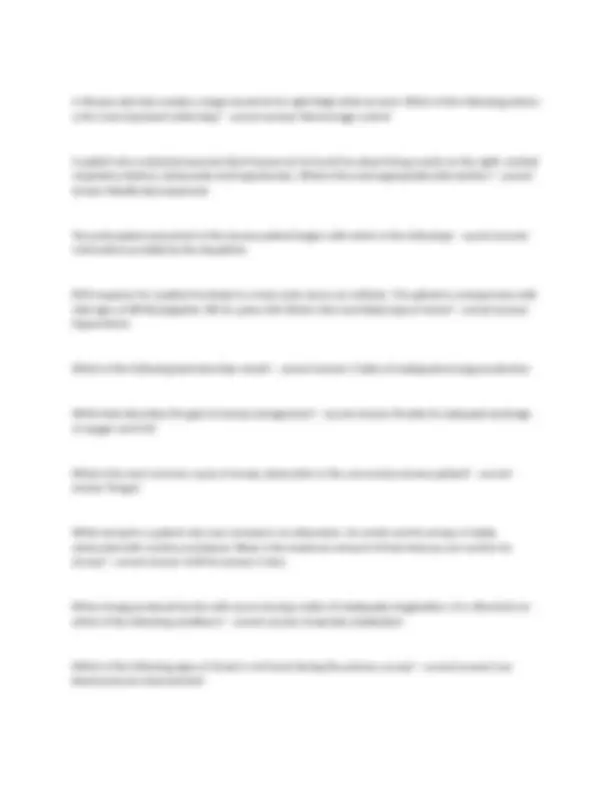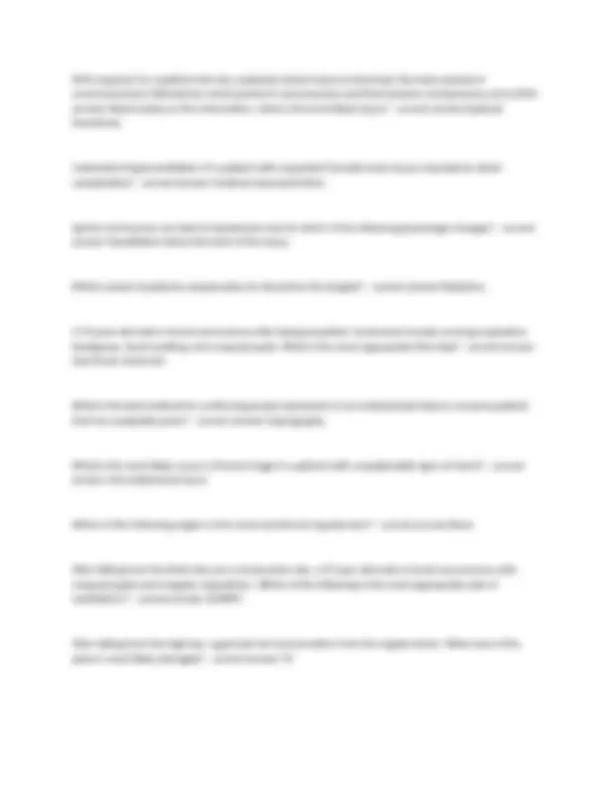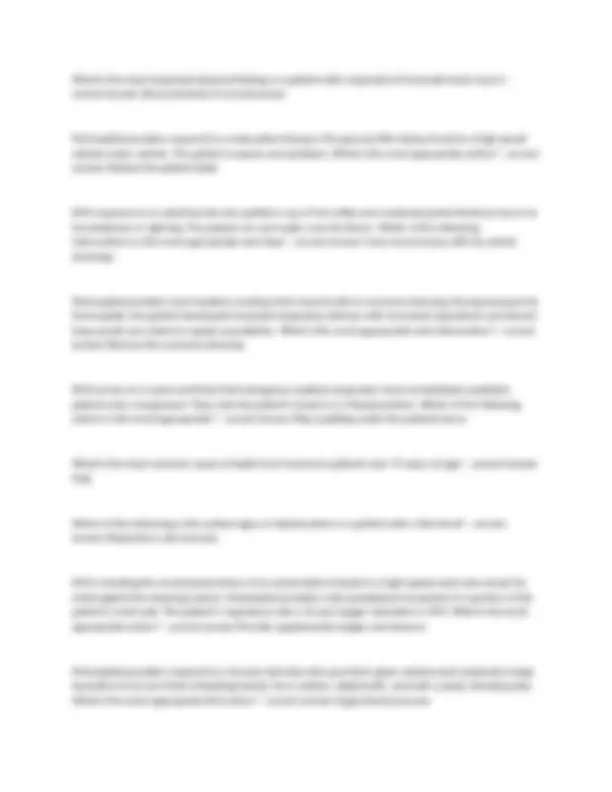





Study with the several resources on Docsity

Earn points by helping other students or get them with a premium plan


Prepare for your exams
Study with the several resources on Docsity

Earn points to download
Earn points by helping other students or get them with a premium plan
Community
Ask the community for help and clear up your study doubts
Discover the best universities in your country according to Docsity users
Free resources
Download our free guides on studying techniques, anxiety management strategies, and thesis advice from Docsity tutors
PHTLS questions and answers already passed
Typology: Exams
1 / 6

This page cannot be seen from the preview
Don't miss anything!




Care of the trauma patient in the field is an evolving science and should be evidence-based. As lifelong learners, we must be prepared to adapt our practices based on research. This is because research may lead to which of the following? - correct answer Change in our current practices In trauma care, a principle is defined as which of the following? - correct answer What needs to be done In addition to oxygen, what is required to maintain the metabolic process of life and energy production?
A patient presents with a blunt trauma injury to the chest. On exam, he has absent breath sounds on one side of his chest and respiratory distress. Which additional signs would indicate that the patient has a tension pneumothorax? - correct answer Hemodynamic compromise In addition to direct pressure, tourniquets and immobilizing fractures, which of the following is most effective in controlling hemorrhage? - correct answer Hemostatic agents Which of the following is a preventable cause of secondary brain injury? - correct answer Systemic hypoxia You are called to treat a patient who is not unconscious when he slipped and fell on a wet floor, striking his head. It is now several hours later. He is awake but confused, does not recall the incident, and is vomiting with a headache. Which of the following injuries is most likely? - correct answer Concussion Which of the following findings indicate the need for immobilization when using a selective spinal immobilization protocol? - correct answer Pain or tenderness along the spine Which of the following patients should be treated first in a blast related multiple patient situation? - correct answer A 30-year-old female with altered level of consciousness and decreased capillary refill Excessive fluid resuscitation of the trauma patient can result in which of the following? - correct answer Increased blood loss When should the secondary survey be accomplished? - correct answer When the time and situation allow When approaching a trauma patient, what is the first assessment must be made? - correct answer Scene safety What is the most common type of shock resulting from trauma? - correct answer Hemorrhagic Which of the following best guides the decision to provide spinal immobilization? - correct answer History and complaint
EMS response for a patient who has sustained a blunt injury to the head. She had a period of unconsciousness followed by a brief period of consciousness and then became unresponsive just as EMS arrived. Based solely on this information, what is the most likely injury? - correct answer Epidural hematoma Inadvertent hyperventilation of a patient with suspected Trumatic brain injury may lead to which complication? - correct answer Cerebral vasoconstriction Spinal cord injuries can lead to hypotension due to which of the following physiologic changes? - correct answer Vasodilation below the level of the injury Which subset of patients compensates for blood loss the longest? - correct answer Pediatrics A 55-year-old male is found unconscious after being assaulted. Assessment reveals snoring respiration, bradypnea, facial swelling, and unequal pupils. What is the most appropriate first step? - correct answer Jaw thrust maneuver What is the best method for confirming proper placement of an endotracheal tube in a trauma patient that has a palpable pulse? - correct answer Capnography What is the most likely source of hemorrhage in a patient with unexplainable signs of shock? - correct answer Intra-abdominal injury Which of the following organs is the most sensitive to hypotension? - correct answer Brain After falling from the third story at a construction site, a 27-year-old male is found unconscious with unequal pupils and irregular respirations. Which of the following is the most appropriate rate of ventilations? - correct answer 20 BPM After falling from the high bar, a gymnast has lost sensation from the nipples down. What area of the spine is most likely damaged? - correct answer T
What is the most important physical finding in a patient with suspected of traumatic brain injury? - correct answer Abnormal level of consciousness Prehospital providers respond to a male patient lying on the ground after being struck by a high speed vehicle motor vehicle. The patient is apneic and pulseless. What is the most appropriate action? - correct answer Declare the patient dead EMS response to an adult barista who spilled a cup of hot coffee and sustained partial thickness burns to the abdomen in right leg. The patient ran cool water over the Burns. Which of the following interventions is the most appropriate next step? - correct answer Cover burned area with dry sterile dressings Prehospital providers have treated a sucking chest wound with an occlusive dressing. During transport to the hospital, the patient developed increased respiratory distress with increased respirations and absent long sounds are noted on repeat auscultation. What is the most appropriate next intervention? - correct answer Remove the occlusive dressing EMS arrives on a scene and finds that emergency medical responders have immobilized a pediatric patient onto a long board. They note the patient's head is in a flexed position. Which of the following actions is the most appropriate? - correct answer Place padding under the patients torso What is the most common cause of death from trauma in patients over 75 years of age? - correct answer Falls Which of the following is the earliest signs of deterioration in a patient with a flail chest? - correct answer Respiratory rate increase EMS is treating the unrestrained driver of an automobile involved in a high-speed crash who struck his chest against the steering column. Prehospital providers note paradoxical movement of a portion of the patient's chest wall. The patient's respiratory rate is 16 and oxygen saturation is 94%. What is the most appropriate action? - correct answer Provide supplemental oxygen and observe Prehospital providers respond to a 16-year-old male who punched a glass window and sustained a large laceration to his arm that is bleeding heavily. He is restless, diaphoretic, and with a weak, thready pulse. What is the most appropriate first action? - correct answer Apply direct pressure